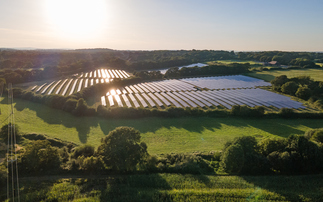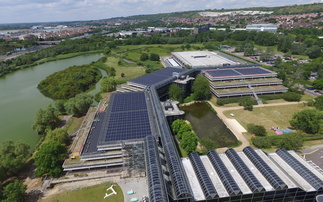Craik, managing director of the UK's first solar-powered recording studio, is remembered by friends and colleagues as a tireless champion for solar power who played an instrumental role in the campaign for the introduction of the solar feed-in-tariff.
Long-time solar campaigner and managing director of the UK's first solar-powered recording studio Julia Craik has died aged 53 due to heart failure and coronavirus-related complications.
Julia, who passed away in hospital on 18 April, was credited by fellow campaigners with having played an instrumental role in catalysing the development of the UK solar industry and raising awareness of the technology with the public and policymakers. She was a central figure in the late noughties campaign to secure a supportive policy environment for the then nascent sector, galvanising high-profile musicians such Lily Allen, Razorlight, and the Klaxons to throw their weight behind a campaign for an effective government subsidy scheme.
She was best known, however, as the long-time managing director of the much-loved - and solar-powered - Premises Recording Studios in Hackney, where she worked with some of the world's biggest musicial stars.
Born in Cambridge in 1966, Julia spent her childhood in Uganda, London, and Dorset. She won a scholarship to attend Cranborne Chase School for sixth form, and went on to study philosophy at Kent University.
After spending her twenties working various jobs, travelling, and volunteering, Julia got a job at the Premises Studios in 1996, where she would work for the rest of her career.
Under Julia's leadership, the studios became one of London's most iconic and best-loved recording spaces, attracting the likes of Amy Winehouse, Rihanna, Buena Vista Social Club, Adele, and many more.
In 2007 Julia installed solar panels on the studio roof, in a move thought to be a world first for a music recording space. The initiative won the Music Week Award for Best Green Business in 2011 and proved popular among artists who could tout their green credentials.
Julia has been credited with popularising the benefits of solar power with the mainstream media, after she recruited several high-profile musicians to the We Support Solar campaign that successfully lobbied the government to deliver the country's first solar feed-in tariff in the late noughties.
We Support Solar - which Friends of the Earth maintains is one of its "biggest and brightest" campaigns to date - resulted in the renewable energy tariff being added to the 2010 Energy Bill, giving the emerging solar industry the critical boost it needed to balloon from powering just a few hundred homes and businesses to the hundreds of thousands of installations around the country today. Julia played a pivotal role in the campaign and at one point sent an email from Premises Studios backing the campaign - with a message from Lily Allen - to every sitting MP.
When she wasn't campaigning for solar issues with Solarcentury and the Renewable Energy Association, Julia also ran the Premises Music Education Programme, which worked with disadvantaged young people in East London, and campaigned for street art.
In 2008, Julia reconnected and fell in love with Richard Preddy, who she had known at Kent University. In 2015, the couple moved to Kent and set up a successful wildflower bee seed business.
In the weeks after her death, friends and colleagues have published touching tributes remembering Julia for her positivity and kindness, her unwavering dedication to the environmental and renewable energy causes and her refreshingly down-to-earth attitude in a famously tough industry.
Julia's Premises Studios colleagues said: "We are all in shock. Julia was our super-organised big sister for the past 24 years and we will miss her dearly."
Singer-songwriter Peter Conway remembered Julia in a tribute in London Jazz News as "passionate, savvy, knowledgeable, level headed and vivacious". "In a business that often thrives on bullshit, individuals who are honest and straight-talking can be few and far between," Conway wrote. "Julia was one of those individuals."
Léonie Greene, formerly director of advocacy and new markets at the Solar Trade Association, said in a Twitter post: "She was wonderful. She knew every pop star going but was the most unaffected, grounded and genuine person. She adored bees and used to sell wildflower seeds at the studio in Hackney. Truly a light has gone out."
In a tribute shared with BusinessGreen that was co-written with Greene, Charlotte Webster, who also worked with Julia on solar campaigns, remembered her friend as a "truly joyful spirit who led the most positive, engaged and creative example".
"She clearly believed in the endless wonder of the natural world, the possibilities of progress and the power of people to change things for the better; proving that, ultimately, at the heart of change lies people with the courage to say 'it is possible'," they said.
"The day she left this world, 18 April 2020, 13 years from calling for a solar-powered UK, a third of the country's power was generated by the sun."









